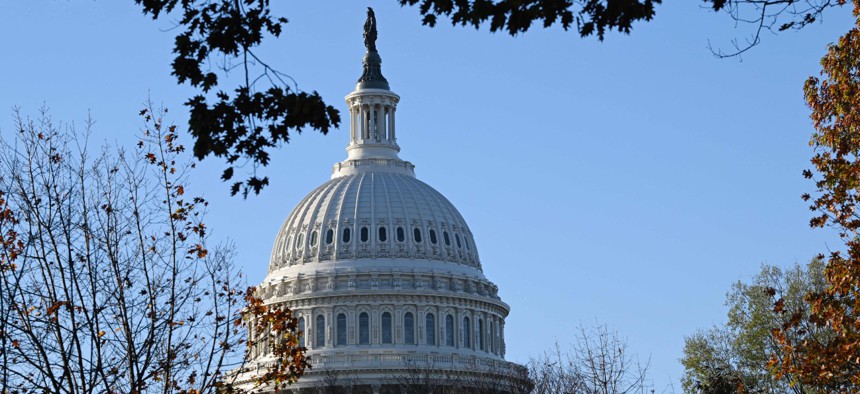
Keeping agencies open will be one of the priorities during the lame duck session. MANDEL NGAN/AFP via Getty Images
What to Watch for in the Lame-Duck Congress
Many of the outstanding issues will have significant impacts on federal agencies and their workforces.
The 117th Congress returned to the Capitol on Monday, beginning its final stretch before new members are sworn into office in January.
Lawmakers will face a jam-packed schedule over the coming weeks as they rush to pass a series of bills required to keep government functioning. In addition to those must-pass measures, Congress could look to usher through high-priority items that have gained momentum but previously failed to get over the finish line. That could include a Social Security fix to boost benefits to some federal retirees and tightening the restrictions lawmakers face in trading stocks.
Complicating matters are the unsettled results of the midterm elections. With Republicans facing a good chance of taking control of the House, their calculations on what to push for now and what to delay could change. Democrats will maintain a majority in the Senate, and may even gain one seat. Here are some of the top issues impacting federal agencies and their workforces that the lame-duck Congress must or may address:
- Avoiding a shutdown: The most pressing item on the agenda before the new year will be keeping federal agencies open. Current funding is set to expire Dec. 16, the last day the continuing resolution will be in effect. Lawmakers must either pass an omnibus package to set line-by-line funding across the government or enact another CR to avoid a shutdown next month. Republicans are favored to take control of the House once all outstanding races are called, which may incentivize them to push for another short-term stopgap into the next Congress to maximize their negotiating power. Sens. Patrick Leahy, D-Vt., and Richard Shelby, R-Ala., the top appropriators in the Senate, are both retiring, however, and have said they will push for full-year funding as their final act. They have yet to announce a breakthrough agreement on top-line spending levels.
- Debt ceiling: The Bipartisan Policy Center has estimated the Treasury Department will not hit the $31.4 trillion debt ceiling, which was agreed to last year, until April at the earliest. Still, Republicans have threatened to use the looming deadline as leverage to cut spending and Democrats are looking to take away that opportunity by addressing the issue this year. There is no blueprint for how the government would operate if it reached and broke through its debt ceiling, though it is clear agencies would not be able to carry out their normal operations. Because typical spending outpaces the revenue the Treasury Department brings in on a given day, the federal government would only be able to pay 60% of its bills in a given month of a default scenario, according to a Bipartisan Policy Center estimate. Some federal workers could be furloughed or asked to continue working on the promise of back pay in the future.
- COVID funding: The White House has for months pressured Congress to provide additional funding to address needs in fighting the ongoing COVID-19 pandemic, including research for improved vaccines. So far, those efforts have been in vain. The White House will renew those efforts during the lame duck and ask for $10 billion, The Washington Post reported on Monday, in conjunction with Ukraine aid and additional disaster response spending. The package overall would add an influx of spending for various agencies, including the Health and Human Services Department and the Federal Emergency Management Agency.
- The National Defense Authorization Act: The annual must-pass defense policy bill is expected to quickly receive consideration in the Senate, where it has already won bipartisan support in committee. The measure includes a provision to delay the sunset of the Defense Department’s two-year probationary period for new civilian hires from the end of this year. Senators may end up voting on amendments to block the president from unilaterally reviving Schedule F, increase the death gratuities and funeral benefits for the families of federal employees who die on the job, enable more federal firefighters to qualify for workers' compensation benefits and open expedited retirement to more federal first responders. All of those provisions were included in a House version of the bill.
- Confirming agency leaders: Senate Democrats had suggested they would prioritize the confirmation of President Biden’s outstanding nominees in case the party lost control of the chamber in the midterms. Democrats will hold onto their majority, but are still expected to prioritize confirmations during the lame duck so the White House does not have to renominate those individuals. The Internal Revenue Service just received a new commissioner nomination, for example, while several agencies have lower level vacancies.







